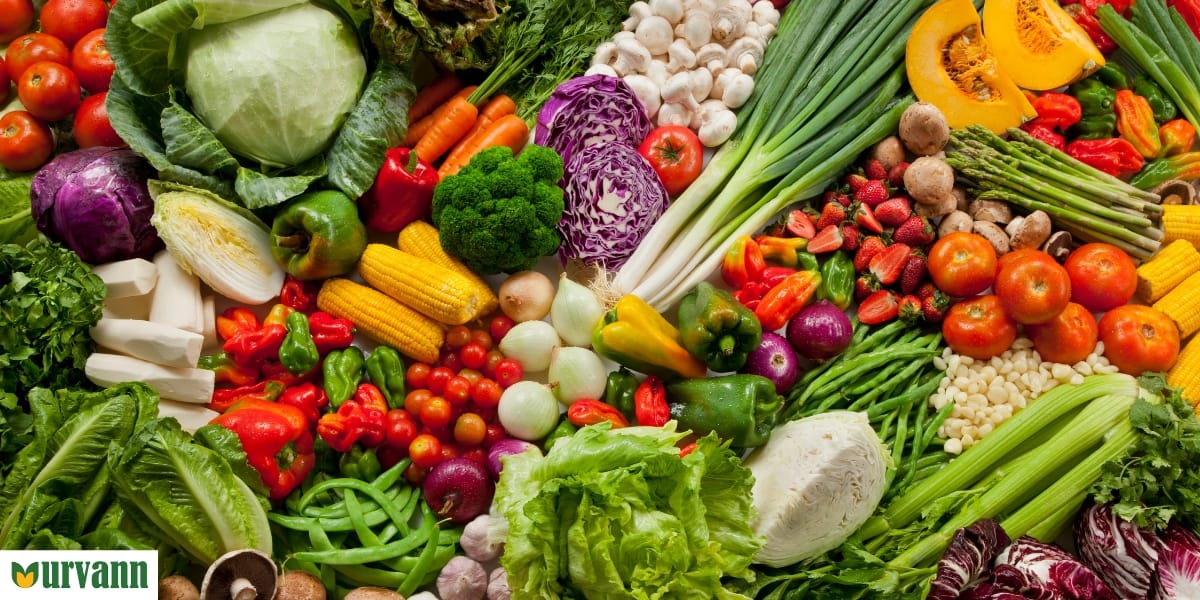As the seasons change and winters arrive, Mother Nature presents us with a new platter of nutritious vegetables. As the temperature takes a dip, some vegetable plants start blooming, fresh and ready to take a bite and dazzle you with their distinguished flavours. This blog will discuss some of the most popular winter vegetables you can quickly grow in your home garden and enjoy with friends and family.
1. Spinach: A Cold-Weather Powerhouse
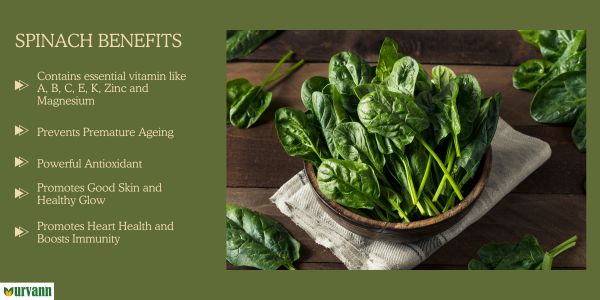
According to many research studies conducted over the years, leafy greens are among the healthiest sources of nutrition for the human body. Spinach is among these, topping the list of the best sources of potassium with all-encompassing benefits for the body.
It is one of the few vegetables rich in potassium, which provides overall health benefits. Spinach grows comfortably in cold weather, generating more flavour and nutritional value as the temperatures drop in North India. In winter, we all love our favourite dishes such as ‘Palak Paneer’ or ‘Palak Pakore’. Imagine how great it would be to pluck this leafy green from our home garden.
Benefits
Spinach has wholesome benefits for the body. It helps your body strengthen its immune system by making your bones healthy. Do you remember the popular cartoon, ‘Popeye’? Remember what he ate? Yes, that is right, it was spinach!
Here are a few more benefits of this green superstar:
- Enhances brain function and boosts creativity levels
- Increase red blood cells or haemoglobin levels in the body. It also cleanses blood of any impurities
- Excellent for eye health
- It is low in calories and can be added to any food, such as smoothies, salads and main course
- It is full of fibre, so it is easy on the stomach, helping to reduce bloating and acidity
2. Amla: The Winter Superfruit

Amla is a superfood packed with a plethora of nutrition for the body. It is a small, tangy fruit with gigantic benefits. It is rich in vitamin C, which strengthens our immune system bit by bit. It is consumed in many forms, such as vitamin supplements and for digestive health. Also known as the Indian Gooseberry, it thrives in winter and can be grown comfortably in winter home gardens. The plant can be grown in pots or directly in the ground and has beautiful green foliage.
Benefits
Remember the yummy ‘amle ka murabba’, a staple in most Indian homes? It is made from the Indian gooseberry combined with honey. Amla is loaded with antioxidants and must be part of your regular diet. You can consume the fruit as jams or juices or even have it in its raw form. Here are a few more benefits of this superfood:
- Amla helps you achieve shine, long, healthy hair
- It is rich in vitamin C and helps to fight infections entering the body by supporting the immune system
- It is low in calories and high in fibre, which means your gut is going to thank you for it
- It helps manage diabetes and heart health
3. Tomatoes: A Winter Garden Delight
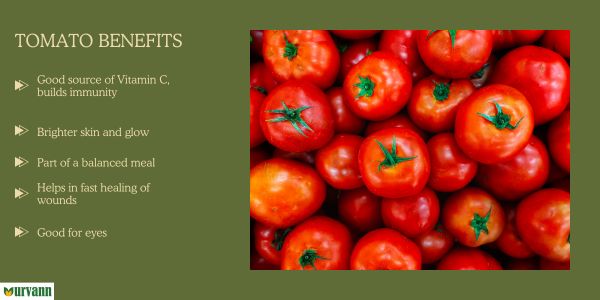
Any dish of any cuisine is incomplete without the tangy flavour of tomatoes. In Indian cuisines, where the focus of any recipe lies in its masala-making process, tomatoes are among the essential ingredients needed to complete the meal. It is generally considered a summer vegetable, but did you know that tomatoes grow all year round, especially in the winter when red is the brightest? They are used in multiple ways. Isn’t tomato soups one of the best? Apart from soups, tomatoes are used in salads, juices, stews, and almost all major recipes for their sweet and savoury flavour. It is a fantastic vegetable with tons of benefits for the body. Plant it in your home garden and enjoy fresh produce free of chemicals and preservatives.
Benefits
Consumption of tomatoes has been linked to many positive benefits for the body. One of the major ones is that they are a primary dietary source of the antioxidant lycopene, which supports heart health. Let us have a look at some more:
- Like all citrusy fruits and vegetables, tomatoes are rich in Vitamin C and are excellent for the immune system
- They are also rich in potassium, which helps in controlling blood pressure
- Daily consumption of Tomatoes has been linked with brighter skin and glow
4. Beetroots: Powerhouse of health
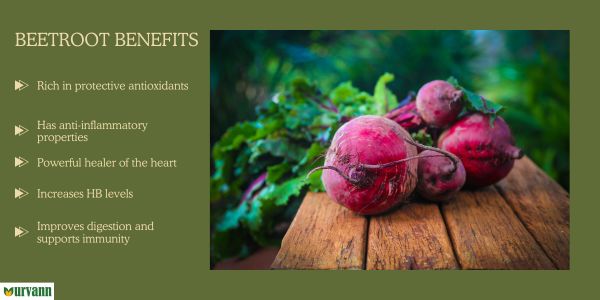
Another vegetable that takes away the title of superfood is Beetroot. This root vegetable grows inside the soil and is packed with nutrition and good health. Also known as ‘Beta vulgaris rubra’ scientifically and ‘Beets’ commonly, the vegetable is a must-have addition to your meal if you wish to live a long, disease-free life. The plant is grown from seeds that are sown directly into the soil. New saplings emerge within 10-12 days, and the plant is ready to harvest 3 months after sowing.
Benefits
Beetroots are vibrant, colourful vegetables that have immense benefits for the body. They are consumed in salads, as part of vegetable juices, in smoothies, or in smoothie fruit bowls. Here are a few more benefits of this beautiful purple-coloured vegetable:
- It is one of the riches sources of iron, which cleans blood of impurities and increases HB levels
- It has micronutrients that help in liver detoxification and lower the risk of diabetes
- It brings a pop of colour to your plate and has a delicious, earthy flavour
- Beets have been found to repair cell damage
5. Capsicum: Winter’s Colorful Crop
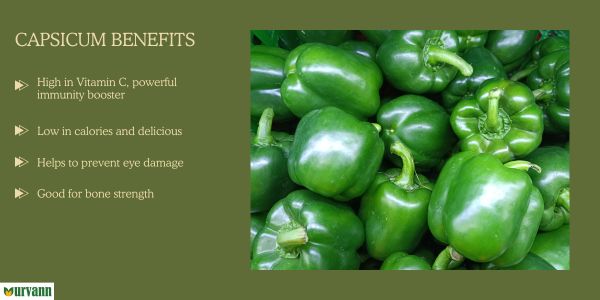
Capsicum, or bell pepper, is another excellent winter vegetable that brings colour and sweetness to your garden. While capsicums are typically a warm-season crop, with a bit of protection, they can also thrive in winter.
Another super delicious winter vegetable is the Capsicum, known as ‘Bell Peppers’ due to their unique bell-like shape. It is nutritious and yummy and can be incorporated in various ways into your meals. In North Indian cuisine, the sweet, peppery flavour of capsicums gives a distinct flavour to each recipe. The capsicum plant grows easily. You can plant in your terrace or balcony garden as it does not spread much. Just make sure it is in a location that receives loads of sunlight.
Benefits
Capsicum is a versatile vegetable that can be tweaked to create various dishes. Our personal favourite is ‘Chilli Paneer served with tawa roti’—yum! Here are a few more benefits of this wonderful vegetable:
- Capsicum contains low fat and is rich in fibre as well as water content
- They are low in carbohydrates and are great for people looking to manage their weight
- It is a light and healthy snack that caters to taste buds while also protecting body functions
- It has been found to help in reducing anxiety and stress
- It is excellent for immunity and eye health
Conclusion
Growing vegetables in your winter garden is a joy. Once you see the mature vegetables hanging from their stems, ready to be harvested and put on your plate, it feels therapeutic.
So get ready, and let us go gardening!


